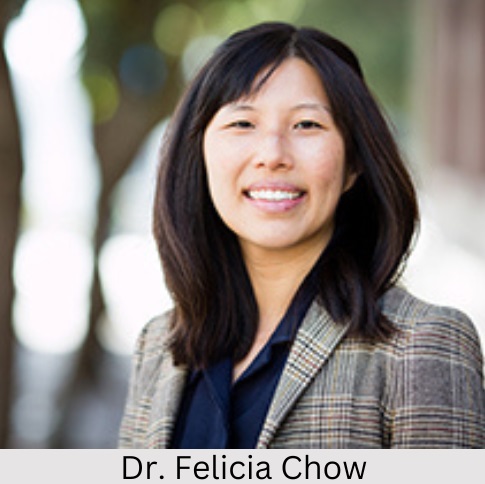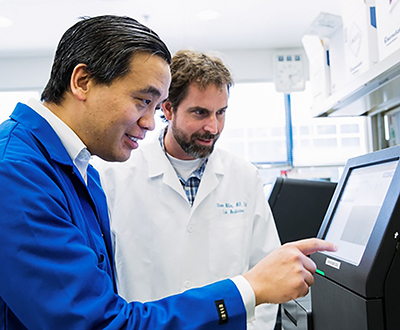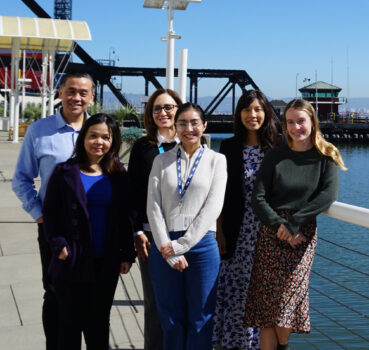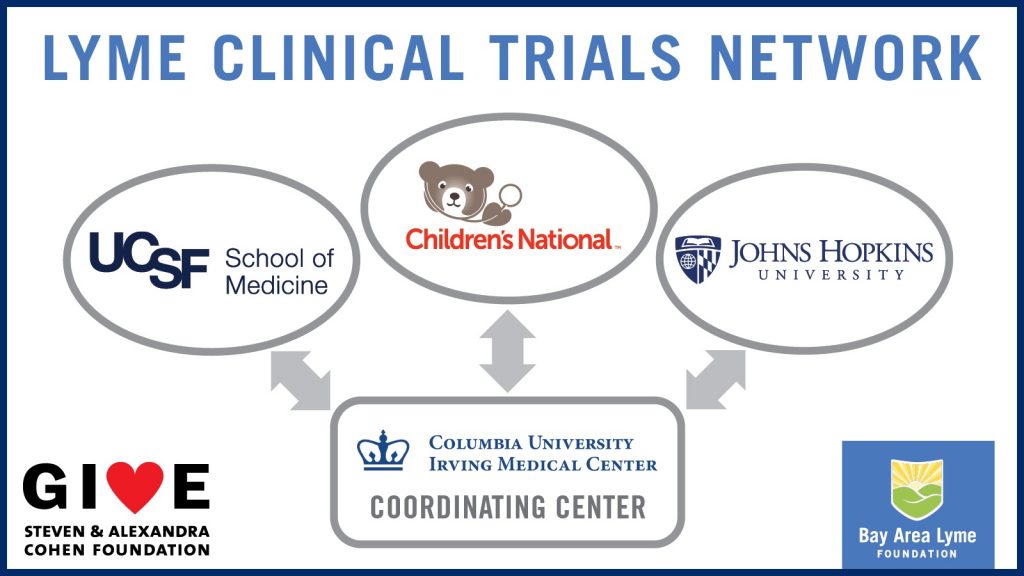What’s ahead as UCSF joins Lyme clinical trials network

By the Bay Area Lyme Foundation
There’s been much excitement in the Lyme community regarding the founding and development of the Lyme Clinical Trials Network since it was first announced.
With a $1 million seminal grant from Bay Area Lyme Foundation, the University of California, San Francisco (UCSF) has joined the Clinical Trials Network to further study and develop better treatments for patients with Lyme and other tick-borne diseases.
The Network aims to address the need for high quality, innovative clinical trials to develop evidence-based treatments for patients with persistent Lyme symptoms following initial antibiotic treatment—a population that has grown to more than two million Americans and continues to increase.
We sat down with Principal Investigator Dr. Felicia Chow to learn more about plans for this California Clinical Trials Network node, and her role as Director of the UCSF Neuro-Infectious Diseases Clinic.
How pathogens invade the nervous system
Dr. Chow is a neurologist specializing in infectious diseases. This means she’s particularly interested in how pathogens such as bacteria, viruses, and parasites, invade the nervous system and cause neurological damage and/or symptoms.
Her expertise is in managing conditions such as brain abscesses, neurocysticercosis (a parasitic infection of the brain), neurosyphilis, and neurological complications associated with HIV. Additionally, she is well-versed in infectious causes of meningitis, encephalitis, and myelitis.
Dr. Chow’s research is dedicated to studying specific populations to understand why certain individuals develop nervous system infections and neurological complications from infectious diseases.
She says, “My overarching goal is to advance the development and implementation of diagnostic tools and interventions that can enhance outcomes for patients with these disorders on a global scale.” So, how did she become interested in Lyme disease?
Around seven years ago, Dr. Chow noticed an increase in patients coming into her San Francisco clinic who had different neurologic manifestations of Lyme disease.
Lyme on the West Coast
“I was seeing more and more patients who hadn’t traveled to Massachusetts, New Jersey, or other places that we know to be endemic for Lyme, but rather had just been in the California Bay Area or on West Coast trips to places that we also don’t consider—at least by the classic maps—as being endemic Lyme areas.”
Obviously, this needed investigation, but sometimes medical professionals aren’t in a place that will allow clinicians to embark on research. Luckily however, being at UCSF afforded Dr. Chow the opportunity to investigate her observation.
After Dr. Chow finished her neurology residency back east, she was looking for someplace where she could do fellowship training in infectious diseases. She notes that as a neurologist there aren’t many places where this subspecialty training is available. However, “UCSF was one of the few places that was willing to think a little outside the box and allow me to put together a fellowship that would let me do both clinical infectious diseases training and combine it with the neurology piece and research training as well. So, that’s how I ended up at UCSF.”
Clinical symptoms of Lyme can vary by region due to differences in tick-borne bacterial species and strains, making timely diagnosis and treatment even more difficult in a region local doctors do not associate with infected ticks—a finding Dr. Chow has noted in her clinic where California patients may go months before receiving a correct diagnosis of Lyme.
The creation of the UCSF Lyme Clinical Trials Center provides research and clinical scaffolding to help address these regional, West Coast differences, with the hope of making treatment more effective, particularly for persistent disease.
Neurological manifestations of Lyme
Dr. Chow’s Neuro-Infectious Diseases Clinic is nested within the Infectious Diseases Clinic at UCSF. This is a somewhat atypical placement because most neurologists have their clinic in the neurology clinic. However, hers is a hybrid, within infectious diseases, which offers her distinct advantages, especially with regards to seeing and treating patients with neurological manifestations of Lyme, a phenomenon that—as an East Coaster herself—she did not expect to see here on the West Coast.

So how did UCSF end up joining the Lyme Clinical Trials network? Enter Dr. Charles Chiu, one of Bay Area Lyme’s long-time collaborators, researchers, and member of BAL’s Science Advisory Board.
Dr. Chow recounts: “Dr. Charles Chiu is someone that I have interacted and collaborated with, and he is already working with Bay Area Lyme Foundation developing new diagnostics for Lyme. He said, ‘Listen, we would really love to start a node for a clinical trial network for Lyme here on the West Coast at UCSF, but in addition to myself, we need a clinician with clinical trials experience who is interested in getting involved in this. Do you want to be a part of it?’ ”
She jumped at the opportunity to team with Dr. Chiu and Bay Area Lyme to become part of the network of sites who are seeking to develop clinical trials that will help Lyme patients.
Finding the right patients for specific trials
From Dr. Chow’s perspective, with UCSF now part of the Lyme Clinical Trials Network, they will have the capacity and resources to look for specific patients who meet the eligibility criteria for the different trials. The trials themselves will vary, but UCSF will be able to target people through Bay Area Lyme Foundation and invite Lyme patients to be a part of these trials. The hope is that the team will be able to offer potential interventions and follow patients during treatment, documenting their experiences.
Dr. Chow cites resources and critical funding from Bay Area Lyme as being a key differentiator. “Although I’ve seen a number of people with neurologic manifestations of Lyme, my bandwidth to see those patients is not high because I see patients who have many other types of infections. As a node in the network with a dedicated team, we can seek out individuals with Lyme who meet our eligibility criteria and then get them enrolled in these different trials.”
There are currently two different trials in development at other Lyme Clinical Trial Network nodes that the UCSF node is hoping to join, rather than launching small, pilot stand-alone studies here in California that could be interesting, but may be too small to draw any conclusions. Dr. Chow explains that joining on to other nodes’ clinical trials is fundamental to the way the network was conceived as a multi-center initiative.
The multi-center approach
The multi-center approach allows for collection of larger data sets, plus affords the researchers and clinicians in the network the opportunity to share information and collaborate more effectively, yielding more robust results and drawing more solid conclusions.
She notes that neither trial is currently IRB-approved, therefore precise inclusion criteria cannot be shared at this time. But the hope is that the UCSF node will have a variety of trials with different types of interventions and different populations. She adds: “My hope is that we’ll get to the point where there’s a clinical trial for everyone, but I think initially we’ll get our feet wet with one or two trials and then build from there.”

Dr. Chow is extremely focused on ensuring that the design, feasibility, and quality of the trials meet the highest possible standards as she understands how invested patients with Lyme are in finding answers that will lead to better diagnostics and treatments for Lyme.
“I think the best thing about being part of this effort is that the whole team—as well as the patient participants—are equally excited and invested in the trials. From a patient perspective, it’s very different from coming into a clinic for a clinical evaluation. This is obviously a situation where we want to find participants who are enthusiastic about the intervention and about the trial that we’re doing. Of course, we want to be sure that it’s a good fit for them. Research is one of those things where we’re always so indebted to the participants who are involved, and we are—of course—also indebted to Bay Area Lyme Foundation for providing the funding that has made this possible. We are so grateful for all your support. I talked before about how important it is to have the resources now to be able to do all of this, and obviously those resources are all because of the Bay Area Lyme Foundation. These are resources both in terms of the grant support, funding support, but then also having your kind of knowledge and expertise and your ties to the Lyme community is just invaluable. ”
Improving outcomes for Lyme patients
Dr. Chow hopes that the trials conducted through the network will not only provide evidence for effective interventions but also contribute to the development of better diagnostics and biomarkers for Lyme disease. Patient-centered care is of paramount concern to her and her colleagues and the UCSF research team aims to make the clinical trial experience as positive and easy as possible for participants. Overall, Dr. Chow is committed to improving outcomes and quality of life for patients with Lyme disease and after almost 40 years of struggle, false starts and opacity, this level of investigation, dedication and care is long overdue.
Felicia Chow is Associate Professor of Neurology and Medicine at University of California, San Francisco. Dr. Chow earned her medical degree from Johns Hopkins University School of Medicine. She completed her neurology residency at Brigham and Women’s Hospital and Massachusetts General Hospital, where she served as chief resident. Following this, she pursued fellowship training in neuro-infectious diseases and HIV neurology at UCSF. Dr. Chow holds a Master of Advanced Study degree in clinical research from UCSF. She is a member of the American Academy of Neurology, the American Neurological Association, the Infectious Diseases Society of America, and the HIV Medicine Association.
If you’d like to take part in future UCSF clinical trials, complete the form on Bay Area Lyme’s website. For more information about Bay Area Lyme, go to bayarealyme.org.





















We invite you to comment on our Facebook page.
Visit LymeDisease.org Facebook Page